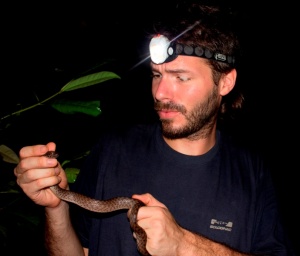Rosa, G.M., Bosch, J., Martel, A., Pasmans, F, Rebelo, R. & Griffiths, R.A. (2019) Sex-biased disease dynamics increase extinction risk by impairing post-decline recovery.
Animal Conservation,
22(6), 579-588. DOI:10.1111/acv.12502 (IF2019 3,210; Q1 Biodiversity Conservation)
The periodicity of life-cycle events (phenology) modulates host availability to pathogens in a repeatable pattern. The effects of sexual differences in host phenology have been little explored in wildlife epidemiological studies. A recent series of ranavirosis outbreaks led to serious declines of Boscas’ newt populations at Serra da Estrela (Portugal). The peculiar phenology of this species, in which a large number of females remain in the aquatic habitat after the breeding season, turns it into a suitable model to test how sex-biased mortality can affect host population persistence in the context of infectious diseases. We investigated how the phenology of Bosca's newt (i.e. biased number of females) mediated the impact of Ranavirus. We then evaluated the risk of extinction of the population under different scenarios of sex-biased mortality using a population viability analysis. Two newt populations (one subject to yearly outbreaks and a comparative site where outbreaks have not been recorded) were tracked for trends over time following emergence of ranaviral disease, allowing us to assess the differential impact of the disease on both sexes. In addition to a significant decline in abundance of adult newts, our data suggest that phenology can affect disease dynamics indirectly, leading to reduction in females and a reversal of the sex ratio of the breeding population. Our models suggest that female-biased mortality does not exacerbate Ranavirus-driven population declines in the short-term, but is likely to have a deleterious impact during the recovery process once the lethal effect of disease is removed from the system.


